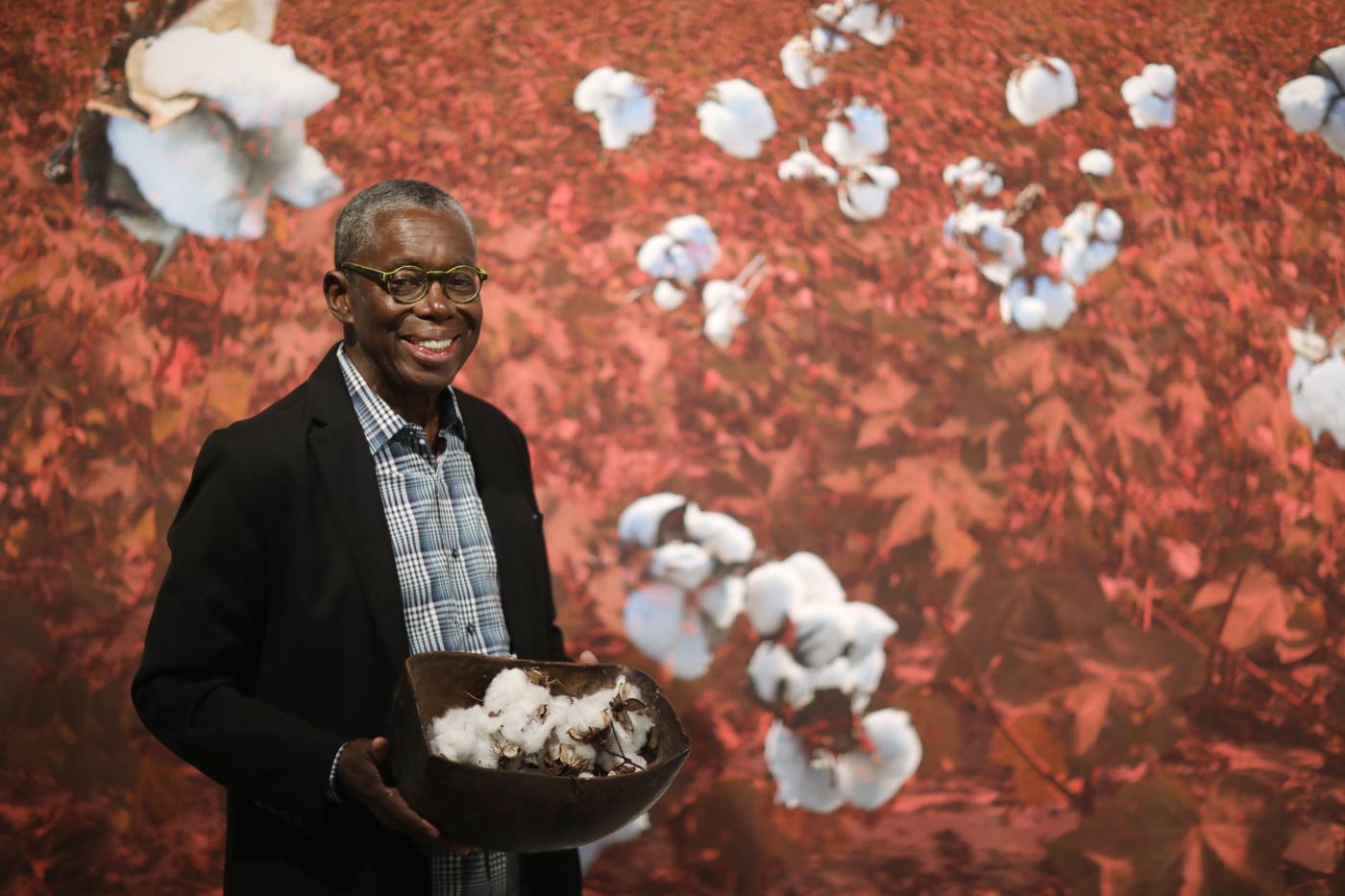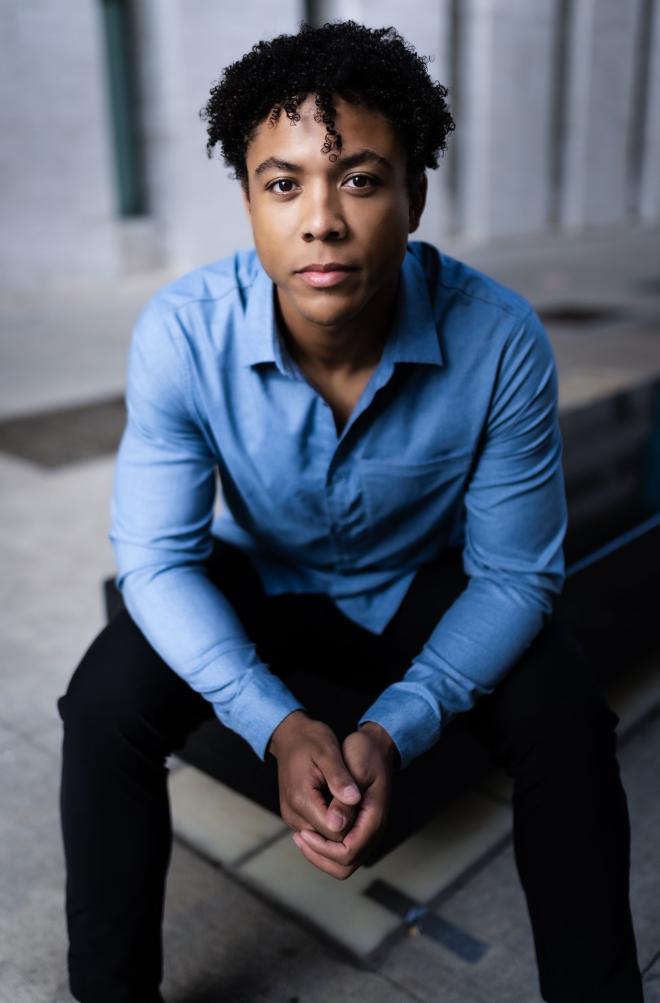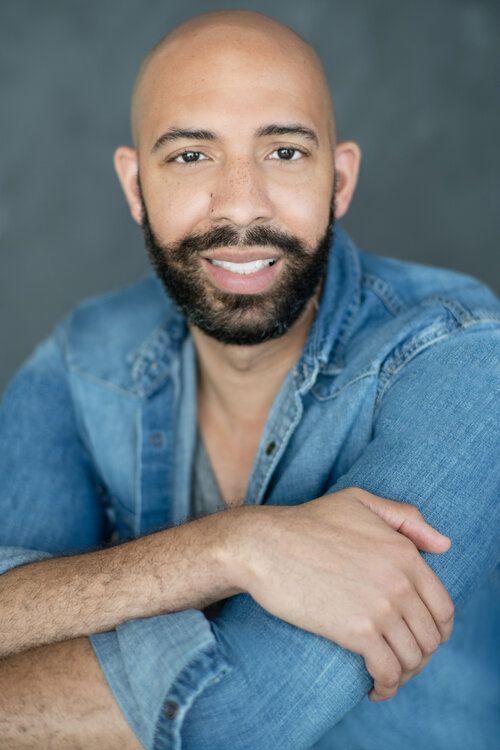On Tuesday, February 28, Washington Performing Arts will present its inaugural Ruth Bader Ginsburg Memorial Recital, COTTON, at the Kennedy Center Terrace Theater. Mezzo-soprano (and Washington native) Denyce Graves, baritone Justin Austin and pianist Laura Ward will perform a new song cycle: composer Damien Geter has set texts by Lauren K. Alleyne, Charlotte Blake Alston, Marc Bamuthi Joseph, Nikki Giovanni, Trapeta Mayson, Glenis Redmond, Afaa Michael Weaver, and Alora Young. This new work is a reflection on a photography exhibit by John E. Dowell entitled COTTON: THE SOFT, DANGEROUS BEAUTY OF THE PAST that has been exhibited at the African American Museum in Philadelphia and at the State University of New York at Oneonta
I was glad to have the opportunity to ask some of the artists and staff of WPA involved about this event.
Evan Keely: COTTON is a new work for voices and piano, but this concert is also a multimedia audio-visual experience that includes spoken word as well as music, inspired by and intertwined with the photography of John E. Dowell. It will have its first performance in Philadelphia a few days before the Kennedy Center event, under the auspices of Lyric Fest. What should audiences expect at these events? What do you hope they’ll take away from the experience?
Elizabeth Racheva, Vice President of Strategic Planning & Chief Advancement Officer at Washington Performing Arts: This performance will offer a dramatic, moving, and immersive sensory experience for audience members. In a seamless, through-composed 60-minute performance, viewers will experience verse, video, photography, song, and spoken word. Newly commissioned poems performed in film by eight poets, inspired by photography by John E. Dowell, set to newly commissioned music by Damien Geter, that is performed by three extraordinary artists, all surrounded by large-scale videographic, panoramas of Dowell’s COTTON photography combine in grand form to create a narrative that will take viewer-listeners on a journey across time, territory, feeling, and experience. Through these profound, and multi-genre layered artistic expressions and responses, we hope audience members will consider our American history, the stories we tell, the perspectives and privilege we possess, and the opportunities we have to reflect upon our shared humanity.
EK: The Washington premiere of COTTON is the inaugural Ruth Bader Ginsburg Memorial Recital. How do you see her legacy intertwining with this particular program?
Jenny Bilfield, President & CEO of Washington Performing Arts: Most importantly, I’d like to recall four elements of the long association that Justice Ginsburg has had with Washington Performing Arts:
- Concerts at the Court and a love for performances. Throughout her time on the Court, Justice Ginsburg worked with our team and with President Emeritus, Doug Wheeler, her close friend, whom she called “Impresario Supreme,” to jointly curate and present many performances at the Court for a small invited audience. She also regularly attended performances we presented, especially at the Kennedy Center, of talented artists in recital.
- A shared belief in Arts Education: Justice Ginsburg’s love for music was kindled by the music classes she took as a public school student in New York, and, in turn, she was a champion for the programs that Washington Performing Arts has in partnership with the DC Public Schools.
- A connection to the artists and theme of COTTON: The Justice was an early recipient of Washington Performing Arts's Ambassador of the Arts Award and had the pleasure, several years later, speaking at the luncheon where the same award was conferred upon her dear friend Denyce Graves. Thus, the connection between Ms. Graves and Justice Ginsburg is an important component of the connection between legacy and program. Even more so — given how the Justice eagerly sought new talent and Justin Austin is becoming a major force in the vocal world.
- COTTON: We designated this new visual song cycle as the inaugural RBG concert as it is a profound evocation of history told in the words, music, and visuals of eminent Black artists (composer, photographer, poets) — of various generations — Justice Ginsburg was a warrior for equality, equity, civil rights, and access. We felt certain that this work was one that would have moved her on many levels.
EK: Should we be thinking of this event as a “first annual” Ginsburg Memorial concert — and if so, are there hopes and plans for future recitals that can be shared with audiences now?
Jenny Bilfield: Thanks to the generosity of many, many friends, admirers, and colleagues of Justice Ginsburg, we have created a Board Designated Fund of nearly $500k to endow The Ruth Bader Ginsburg Memorial Award and Recital in perpetuity. Look for the next one when we announce our 2023-24 season. Lead gifts of more than $365,000, secured from Spring to Fall 2021, lay the foundation for the campaign. Washington Performing Arts’s RBG Fund is a living memorial to one of the most beloved, influential, and exemplary figures in recent American History. For more information: https://www.washingtonperformingarts.org/support/rbg-fund/
EK: Justin Austin, you’re a stranger neither to new music, nor to art that explores and elevates Black American voices and experience: you’ve appeared at the Met in Brett Dean’s Hamlet, Ricky Ian Gordon’s Intimate Apparel at Lincoln Center, and Terrance Blanchard’s Fire Shut Up in My Bones with Lyric Opera of Chicago. You were also a soloist in December in a Cecilia Chorus of New York performance of an older work that’s becoming better known just in the last few years (thanks in part to a 2019 recording conducted by Malcolm J. Merriweather), a 1954 Christmas cantata by Margaret Bonds and Langston Hughes, Ballad of the Brown King (which WETA Classical has featured on Choral Showcase and our podcast, Classical Breakdown). Tell us how you see COTTON in the trajectory of your journey as an artist.
Justin Austin: As you alluded to, I love new music. I particularly love new music that sheds light on American stories, culture, and brilliance. Having grown up in the opera world, I realized early on that American opera never received the same respect as European opera. I completely understand that opera, as we know it, was created by Europeans, but I think what Americans have done with the art form is nothing short of magnificent. I have made it my mission to dedicate my talents not to just the great European composers and traditions, but also to what’s happening in my own country within the world of classical music. COTTON is a prime example of some of the best USA has to offer artistically coming together harmoniously. COTTON is the words of multiple generations of extraordinary living American poets inspired by the incredible photography of a living American legend set to music by an acclaimed living American composer about a story that is uniquely American interpreted by a group of three American musicians. Composer Damien Geter wrote the song cycle COTTON for myself and mezzo soprano Denyce Graves, featuring pianist Laura Ward, who commissioned the piece. I first met Damien when I premiered his opera American Apollo at the Washington National Opera. We started a collaborative relationship then that would transcend any of our preconceived ideas of what a composer/singer collaboration could look like. I just adore his music and his attention to text and detail. He is a singer himself, so when he sets something for the voice, it sings beautifully and naturally. I’m also a huge fan of Denyce. We just performed together this season in the Met’s production of Benjamin Britten’s Peter Grimes. Our respective characters interact a lot in the opera and throughout the rehearsal and performance process, we became friends. Premiering Damien Geter’s COTTON with Denyce Graves means a lot more to me than face value, which is already quite high. It’s an opportunity to share some of the most vulnerable parts of what it means to be Black in America with collaborators that truly understand who I am.
EK: Damien Geter, it will be good to hear your music once again at the Kennedy Center, which was the site of the east coast premiere of your choral/orchestral work, An African American Requiem. Can you tell us about the relationship COTTON has to your work — not only as a composer, but as a conductor and singer?
Damien Geter: COTTON falls in line with a large swath of my compositions in that they are commentary on the Black experience. While this is not all that I write about, the cause for social justice is an ongoing fight. I choose to battle it out through music.
EK: BAMUTHI: You are Vice President and Artistic Director of Social Impact at the Kennedy Center, and a storyteller, poet, actor, librettist and activist whose work is one of the texts set to music in Geter’s score. As you yourself have said, you work “with the belief that if racism is structural, then anti-racism also must be structural.” I’d be interested in your thoughts about how this Washington Performing Arts concert, hosted at the Terrace Theater, squares with your hopes for the Kennedy Center and your vision of its mission — in Washington, and beyond.
BAMUTHI: Art is oxygen for the lungs of the body politic, and the Kennedy Center is rare air.
Our work is to remember that some of us can’t breathe.
Under President Deborah Rutter, we have asserted our aspiration to be an institution that invites art into the lives of ALL Americans. In its sweep, that goal is almost constitutional. It evokes a kind of 14th-Amendment-wide understanding of the American franchise, a belief in “inspiration for all.” At the Kennedy Center, our work is to empower artists and community. Our work is to produce impactful performances and perform with the civic good in mind as we activate the REACH. Our work is to deploy the artist intellect when we examine culture and consider who leads. As an organization committed to anti-racism, we believe that we can justly ask questions of social conflicts from a reservoir of art-based instincts. We wish to leave NO one out of the dialogue. We work to both hold center AND expand the radius.
COTTON is a performance that encapsulates all these principles and brings them to life. It is multi-layered, investigative, historically incisive, and in its cross-genre expression, creates multiple avenues of access for audiences. It is a beautifully aligned intersection between my institutional work and my creative identity as an American artist in persistent search of a more perfect union.
PBS PASSPORT
Stream tens of thousands of hours of your PBS and local favorites with WETA+ and PBS Passport whenever and wherever you want. Catch up on a single episode or binge-watch full seasons before they air on TV.


